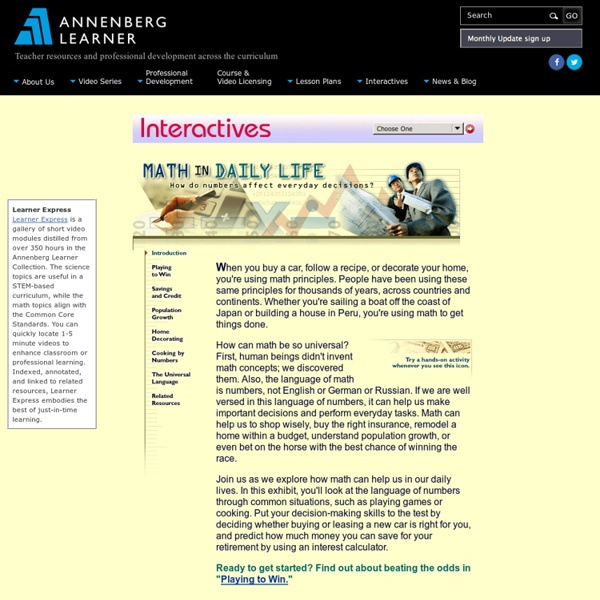



http://www.learner.org/interactives/dailymath/
Related: Mathematics Unit & Lesson PlansAtlas - Home You are using an unsupported internet browser. Atlas may not function as designed. Please download one of these updated browsers: Don't show this againAtlas is phasing out support for your internet browser. Why Do People Have Difficulty with Geometry? When people recall their geometry learning experience, many of them recall it not only as an unpleasant experience, but they often also recall difficulties that they experienced in learning geometry. These two facets of learning, unpleasantness and a lack of depth of understanding, go hand in hand. When we find it difficult or impossible to understand an area of study, we typically resort to rote memorization, and this entire experience is distasteful to most people. So why is it that geometry is so often the school mathematics topic that people remember with unpleasantness and a lack of comprehension? The answer hinges on an inadequate school geometry curriculum.
FREE Real World Math Problems for Homeschool I’ve found that math can get rather boring if all you do is learn a problem style and then do a page of problems with that style, so lately I’ve been on the hunt for some free real world math problems that would stimulate curiosity in the kids. Here are my favorite sites that I’ve found with FREE problems. Source: cityyandcolour.tumblr.com via Nicole on Pinterest Figure This! This site has about 80 different Challenges that you can choose based on mathematical skill set necessary. We haven’t used these yet, but they are on our to try list.
common core resources /mathematical content standards /standards by grade /8th grade / Problems of the Month: Non-routine problems designed to be used schoolwide to promote a problem-solving theme. Each problem is divided into five levels of difficulty, Level A (primary) through Level E (high school). The problems are aligned to the Common Core standards. Learn more here. Teach21 Project Based Learning Students should begin this unit with a firm understanding of right angles and perpendicular lines. They should also have a working knowledge of PowerPoint or other presentational software. The culminating project of this learning experience is an oral presentation, so if the students have not had previous experience with presenting before an audience you may wish to review the important aspects of that process. You should create a Lifeline Folder that students can access when they need additional support throughout this unit.
Functional maths starters Functional Skills and 2010 GCSE's To thrive in an economy defined by innovative application of knowledge, we must do more than absorb and feed back information. Learners and workers must draw on their entire spectrum of learning experiences to apply what they have learned in new and creative ways. Diploma and it's Pedagogy QCA/08/3908 Teaching Functional Maths – A Possible Approach
Building Bridges This lesson assists teachers in building a bridge between their current instructional goals and new goals that emphasize an earlier introduction to algebraic thinking. In the activities which follow, we illustrate an approach to algebraic thinking that is based on an extension of problem-solving tasks typically investigated by elementary and middle school students. Problem Tasks Pose the following question to students. They may work individually or in groups, depending on their needs. Note that the task is completed once the single solution has been determined.
Geometry Interactive Lessons Best Results From Yahoo Answers Youtube From Yahoo Answers Question:I am not asking you to do my homework for me, but I would highly appreciate it if you could help me out on this project. I have to take pictures of our geometry class's lesson concepts in the real world. Could you help me find examples of the following: -points -planes -line segments -midpoint -segment bisector -acute angle -obtuse angle -right angle -acute triangle -obtuse triangle -right triangle -scalene triangle -isosceles triangle -equilateral triangle
Problem Solving Lesson Plan: The Quandary Game Preparation: This lesson plan is centered around the online game Quandary. In Quandary, players make difficult decisions that have no clear right or wrong answers, but important consequences – to themselves, to others in the colony, and to the planet Braxos. In their interactions with other settlers in the futuristic colony, players must consider facts, opinions and solutions, just as in real life. Johnnie's Math Page - Fun Math for Kids and their Teachers Johnnie's Math Page is the site to find fun math for kids, math games, and even a little math homework help. Interactive math activities from across the web have been organized by topic to make math learning enjoyable and interesting. These activities have been chosen to represent the range of math learned from kindergarten to middle school.
Lessons - Robert Kaplinsky - Glenrock Consulting, LLC Skip to content Search Search: s Digital Teachers’ Lounge Blake Harrison, left, and Alex Rappaport of Flocabulary. This week findingEducation caught up with Blake Harrison, a.k.a. Emcee Escher, rapper, educator and creative director of Flocabulary, to hear how he and Alex Rappaport, cofounder and executive producer, are bringing their energy and passion for hip-hop to the classroom. By weaving words into rhymes with infectious beats, Harrison and Rappaport knew they could engage students and ultimately teach them something. Their first CD, released in 2004, put vocabulary words in context, helping prepare students for the SATs. Since then, they’ve developed programs for teaching world and U.S. history, math, science and even Shakespeare.